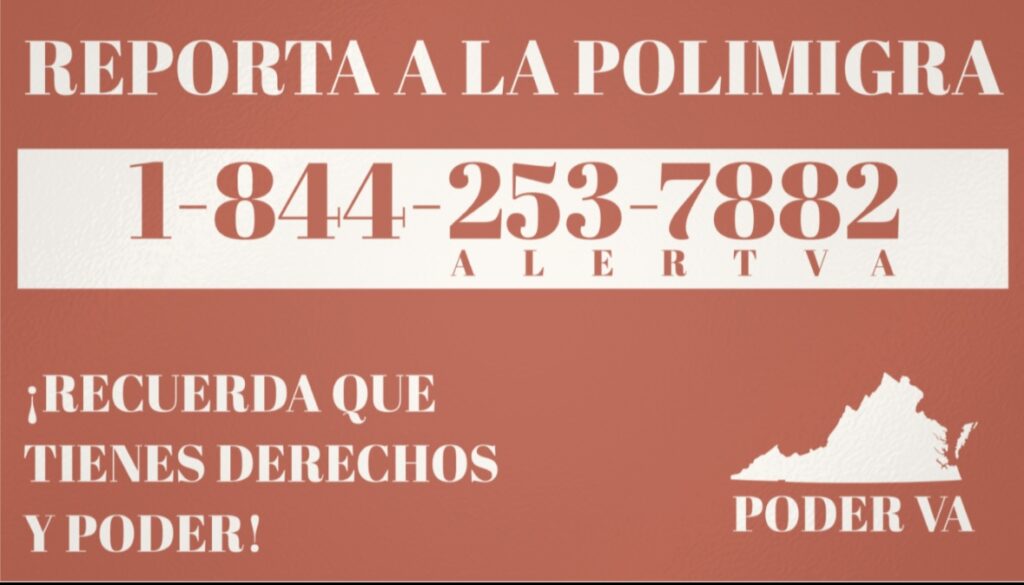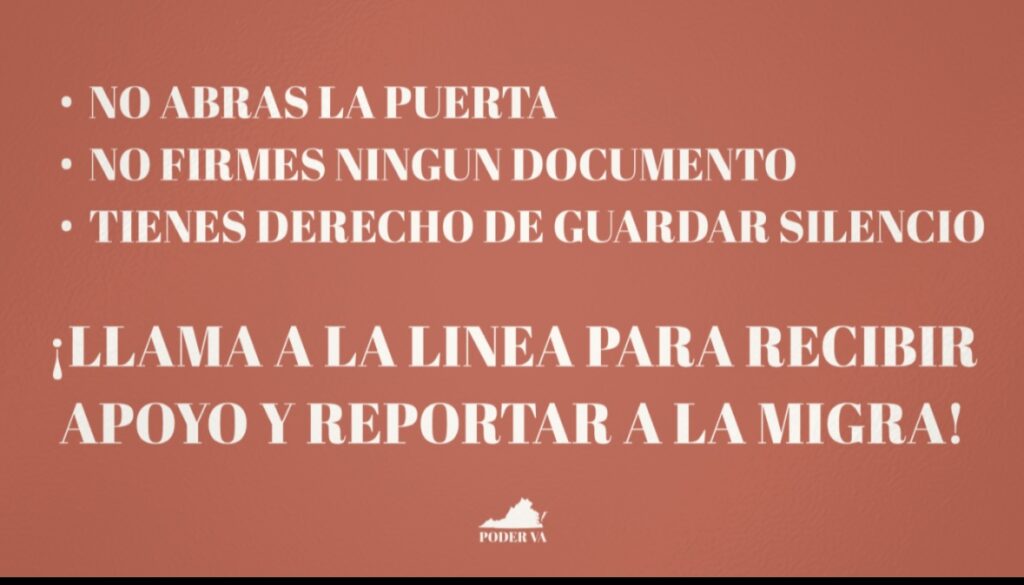On this page you will find resources that will allow you to prevent and be prepared for immigration emergencies such as raids, ICE visits to your home, detention, or risk of deportation. Use the menu below to navigate between resources.
Know Your Rights Information
Information on your rights during the immigration process and deportation information.
DISCLAIMER: The Legal Aid Justice Center provides free legal services to low-income individuals on an array of issues, including immigration matters, and defends the interests of low-income communities. The Legal Aid Justice Center does not represent government agencies or nonprofits. The information provided herein is for educational purposes only, does not constitute legal advice, and does not create an attorney-client relationship. Entities seeking legal advice should consult an attorney.
DESCARGO DE RESPONSABILIDAD: El Legal Aid Justice Center brinda servicios legales gratuitos a personas de bajos ingresos sobre una variedad de temas, incluidos asuntos de inmigración, y defiende los intereses de las comunidades de bajos ingresos. El Legal Aid Justice Center no representa a agencias gubernamentales ni a organizaciones sin fines de lucro. La información proporcionada en este documento es solo para fines educativos, no constituye asesoramiento legal y no crea una relación abogado-cliente. Las entidades que buscan asesoramiento legal deben consultar a un abogado.
La ley de registro de extranjeros exige que ciertos no ciudadanos en EE. UU. se registran con el gobierno. ¿Qué significa realmente?
ITINS y declarar impuestos
Video update – Sensitive Locations (ENGLISH)
Cambio de poliza de ubicaciones sensibles – Grabación (Español)
Know Your Rights, Preparing for 2025 (SPANISH)
Know Your Rights, Preparing for 2025 (ENGLISH)
Keep calm! You have constitutional rights.
- DO NOT OPEN THE DOOR. No one can enter your home without your consent: “I will not open the door if I do not have a court order signed by a judge or magistrate.”
- If ICE enters your home, say: “I DO NOT consent to the search.”
- Exercise your right to remain silent! “I will not answer any questions and I exercise my right to remain silent.”
- DO NOT SIGN ANY DOCUMENTS: “I will not sign any documents without first speaking to my lawyer.”
- Keep calm and it is better to remain silent (any incorrect information can harm you)
If officers come to my house, how do I know they are from ICE?
ICE agents will often pretend to be police officers and say they want to talk to you about an issue such as identity theft or a case they are investigating. If they say “WE ARE THE POLICE,” ask them to slide your card or warrant under the door or show it through the window.
Do I have to let ICE or the police into my house?
You do NOT have to let ICE or the police in unless they have a warrant signed by a judge authorizing them to enter and arrest someone in your home. You must ask them to slide the warrant under the door before opening it. In the vast majority of cases, ICE will not have a warrant and would need YOUR consent to enter your home. Opening the door does not mean you are giving your consent.
- Review the name of the court or agency that is listed at the top
- It must say “district court” at the top to be a judicial warrant. If the warrant says “Department of Homeland Security” it is an administrative warrant and is not enough to enter a home or other private space.
- Review the warrant for accuracy
- Remember that you have rights
- To ask to end the interaction with ICE: “Can I leave?” (for your safety, do not run ro resist arrest)
- To not provide information that will be used against you in immigration proceedings
- To not consent to ICE entry or to a search without a judicial warrant
- To not sign any documents without fully understanding them
Family Preparedness & Planning
An emergency plan is a document that everyone should have to protect themselves and their families in the event of an emergency, whether it be a fire, an earthquake, or an interaction with or arrest and detention by ICE. Make sure people you trust know where this document is, why it is important, and how to get it if you are detained by ICE. Be sure to keep your plan up to date and remember to never share this document with ICE.
In the event of an immigration emergency, it is important to have a list of contacts who should to be notified of what is happening. Your emergency list should include anyone who needs to be notified. This list shouldn’t be limited to family members. Your list should include contact information for your home, your office or people you trust. Make sure people you trust know where this document is, why it is important, and how to get it if you are detained by ICE. Be sure to keep your plan up to date and remember to never share this document with ICE.
A rule goes into effect on April 11, 2025, that sets up a new process for non-citizen “registration” throughout the United States and requires individuals to carry proof of their registration.
This form is to designate an adult to be a standby guardian of your minor child(ren) in the event you are detained, incarcerated, or deported in connection with immigration action. The purpose of this form is to ensure a child’s well-being if their primary caregiver is unable to provide care due to a triggering event like illness, accident, or legal issues.
A limited power of attorney (POA) is a document that gives someone the authority to act on another person’s behalf for a specific time and within certain limits. For immigration purposes, a POA can be used to grant a trusted family member or friend the authority to act on your behalf in case of deportation or detention.
HOTLINE FOR ICE ACTIVITY
PODER VA is a community defense campaign built by and for immigrant communities across Virginia. It exists to Protect. Organize. Defend. Educate. Resist.
In response to the alarming rise in ICE activity and local law enforcement collaboration, PODER VA is launching as a rapid response network to ensure our communities are informed, supported, and defended.
We provide:
A hotline for reporting ICE activity and connecting to legal help
Legal referrals, Know Your Rights materials, and support in crisis moments
Community education, tracking of enforcement patterns, and organizing tool.
A network rooted in love, protection, and collective power
HOTLINE:
1-844-253-7882
Call to report ICE activity, ask for support, or get connected to resources


Other active hotlines to report ICE activity in Virginia include:
CASA’s raid tip hotline at 1-888-214-6016 to report any ICE activity (Know Your Rights – We Are Casa)
Migrant Solidarity Mutual Aid’s Hotline at 202-335-1183. (MSMA Launches ICE Emergency Hotline — Migrant Solidarity Mutual Aid Network “We collect that information and share it with our immigrant community so they can avoid the area and stay safe. We will be posting reports of ICE enforcement on our social media channels, and will provide resources to people that call our hotline looking for support.”)
Tools & Resources
On January 20, 2025, the Trump Administration replaced a policy that protected certain areas (churches, schools, hospitals, etc.) from immigration enforcement with one that gives ICE the ability to enter these essential locations. Read and download guidance about this change in English and Spanish below.
A rule goes into effect on April 11, 2025, that sets up a new process for non-citizen “registration” throughout the United States and requires individuals to carry proof of their registration.

